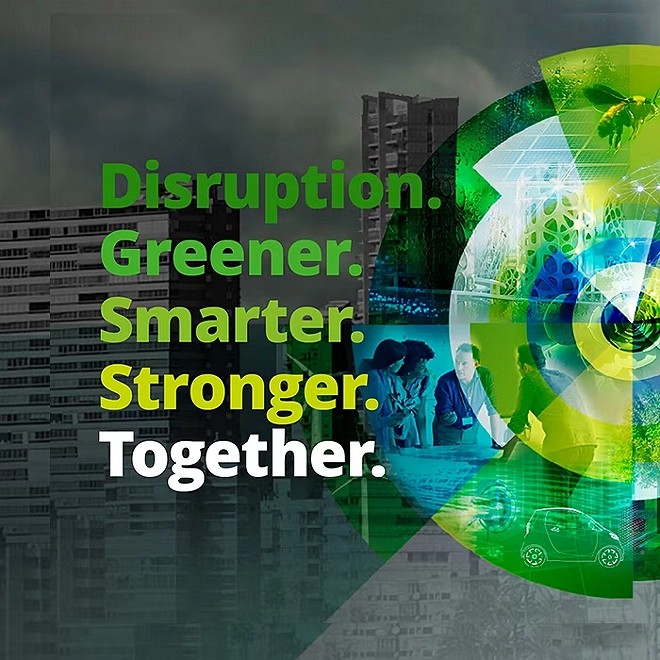Reshaping Europe to Build a More Sustainable Future
A series of five high-level global policy discussions, Reshaping Europe brings senior stakeholders together to share their vision on how to build a more human-centered, sustainable future for Europe.
Reshaping Europe
Unprecedented crises are now reshaping our world. In Europe, governments are grappling with COVID-19’s aftermath as well as confronting climate change amidst escalating geopolitical tensions and a humanitarian crisis stemming from the war in Ukraine.
The Reshaping Europe series provides insights on Europe’s current challenges, bringing together stakeholders from across the globe to discuss how to build a greener, more digital, and more resilient post-pandemic Europe. Leaders will focus on reconciling EU priorities with the increased need for defense & security as well as the need for effective and united humanitarian approaches.
Reshaping Europe | Webinar 2 Climate & Energy Transition
The second webinar of the Reshaping Europe series focused on the risks of Europe's reliance on fossil fuels and single energy suppliers, rising energy prices, and how to build momentum toward a green transition.
New agreements and investments key to addressing the energy crisis in the European Union
For Kadri Simson, EU Commissioner for Energy, the prime focus in this energy crisis has been to help ensure energy security in the EU through new agreements that diversify energy suppliers—with dependency on Russian gas already decreasing to 9% from 40% (i) —as well as via significant infrastructure investments in liquified natural gas (LNG,), clean hydrogen, and renewables. These actions are being accompanied by joint measures by EU member states to purchase gas, pass new regulations for gas storage, and develop agreements to help reduce energy demand. Additional actions outlined in the REPowerEU Plan reinforce the need to increase targets in the EU energy mix to 45% renewables by 2030. This will likely entail adopting legislation to help ease permitting processes in cases of low environmental risk and speeding up investments in hydrogen, solar, wind, biomethane, and thermal energy. For example, according to EU Commissioner Simson, one goal is to “double solar photovoltaic capacity by 2025.”
Strategic and bold decisions likely needed to move the energy transition forward
To make the climate and energy transition happen, “the status quo will need to be challenged in many domains,” noted Anna Kowalewska,Deloitte Central Europe Sustainability Leader for the EU institutions and moderator of the panel discussion. She points out that there are difficult choices to be made on the path to reduced dependencies in energy supply chains and in achieving net-zero in an equitable manner. This will likely require innovation not only in technologies but also in business models and legislative approaches, as well as collaboration. She highlighted the importance of the recently announced Green Deal Industrial Plan, that aims to contribute to this dual objective by laying down a policy and regulatory framework that should enhance the competitiveness of Europe's net-zero industry and support the fast transition to climate neutrality.
Operationalizing the energy transition on the ground can bring new challenges and opportunities
For Simone Mori, ENEL’s Head of Europe, Europe proved resilient in the energy markets this past winter, as contraction in gas demand yielded little negative impact on GDP or quality of life. Positive signs of continued resilience include higher investments in renewables distributors and the larger part many citizens are playing in decarbonization, for instance, by installing solar panels. While “the short-term reaction was good,” Mr. Mori argues that this transformation needs to happen in a structural way, rather than on an emergency basis. Investing in green hydrogen, reinforcement of grids, and accelerating energy permits is therefore key. He also noted the importance of following a competitive market model when proposing new measures to avoid destabilizing markets and to reach a win-win scenario for both investors and customers.
Even though REPowerEU may set the right ambition for 2030, Joe Oliver, Deloitte US Government and Public Services Energy Sector Leader, believes that success will likely depend on addressing the big challenges intrinsic to large power projects—namely the long lead time for development, financing, and construction. Projects such as these would need to be approved and commissioned now to be able to operate by 2030. To help succeed, governments may need to quickly act on three main fronts: 1) establishing clear policies (e.g., visibility of scope and duration of competitive auctions for renewables); 2) reducing costs to industry by streamlining and accelerating the permitting process; and 3) expanding grid transmission and distribution capacity for intermittent renewable energy. Mr. Oliver referenced the US Infrastructure Investment and Jobs Act and the Inflation Reduction Act to highlight how big-scale infrastructure investments can be supported. In particular, he noted the focus on incentives through tax credits to the private sector to help develop and accelerate new markets.
European Investment Bank (EIB) Vice President Kris Peeters highlighted the EIB’s key role in advancing Europe’s green energy objectives. As the climate bank of the European Union, the EIB aims for at least 50% of its financing to address climate change by 2025, with the goal of mobilizing more than one trillion euros in green projects by 2030. According to Vice President Peeters, in 2022, the share of EIB investments that went to climate action and environmental sustainability projects was 58%. In support of the RePowerEU Plan, the EIB will provide an additional 30 billion euros for investments in renewables, energy efficiency, grids and storage, charging infrastructure for electric vehicles, and innovation in green technologies across the board. For Europe as a whole, Mr. Peeters believes the Green Deal Industrial Plan is a good starting point for what should be the priorities for green competitiveness. Furthermore, Lídia Pereira, Member of the European Parliament and co-host of the event, noted that the green economy is an opportunity to help transform energy systems, adopt more sustainable practices, and to help create new economic opportunities and jobs.
(i) Russian gas exports to EU will fall by 50 bcm this year, Reuters, 15 September 2022.
Agenda
Keynote speaker
Kadri Simson, Commissioner for Energy, European Commission
Panelists
Kris Peeters, Vice-President, European Investment Bank
Joe Oliver, Government and Public Services Energy Sector Leader, Deloitte
Simone Mori, Head of Europe, Enel S.p.A.
Moderator
Anna Kowalewska, Sustainability Leader, Deloitte Central Europe.
Hosts
Lídia Pereira, Member of the European Parliament.
Miguel Eiras Antunes, Public Sector Leader, Deloitte Central Europe.
Reshaping Europe | Inaugural webinar: Stronger together to build a more sustainable future
The inaugural “Reshaping Europe” webinar aired live from the European Parliament in Brussels on 30 June 2022, focusing on the responses to the current humanitarian crisis. The webinar covered the challenges and actions at all levels of governance as they work to support Ukraine and its people.
Key takeaways:
- In order to address the full scale of this crisis—“One of the largest displacement crises in Europe, but also in the world, since World War II”—unprecedented and united responses and actions across all levels of governance are needed. As stressed by Shabia Mantoo, Global Spokesperson for UNHCR, the UN Refugee Agency, cooperation among the EU, national governments, local governments, international humanitarian organizations, corporates, and civil society is critical to helping the more than 5 million refugees from Ukraine.
- At the EU level, Roberta Metsola, President of the European Parliament, asserted that in response to this act of aggression, “Europe spoke with one voice when it mattered the most.” EU support to Ukraine has been unprecedented, from supplying military weapons and providing humanitarian aid to launching six packages of economic sanctions against Russia. Priorities for the EU now include building a Defense Union, reducing energy dependency on Russia by achieving a green transition, and ensuring food security.
- For the Ukrainian government, receiving the EU’s political support with its assignment of Ukraine as an EU Candidate was more than symbolic: it was recognition of the country’s efforts to implement the EU-Ukraine Association Agreement of 2014 to build new economic and political ties between both parties. Natalie Forsuyk, General Director of the Government Office for Coordination of European and Euro-Atlantic Integration, emphasized the importance of the EU-supported reconstruction platform as critical infrastructure will need to be rebuilt. This platform, said Forsuyk, will “manage in a sustainable and transparent manner the help that will come not only from the EU and member states but also from international financial institutions and other countries in the globe.”
- Local governments in Ukraine are under immense pressure to respond with the limited resources they have to evolving needs on the ground. “We, as councillors and active people, every day from early morning to late night, are trying to find a way to help soldiers on the frontline,” explained Dinara Habibullaieva, Member of the Kyiv City Council. This includes supplying equipment as well as such simple items as power banks, medicine, and tourniquets while at the same time drawing on support at the international level to help displaced citizens. Concerned about “war fatigue,” Habibullaieva urged the audience to remember that “Kyiv is not fighting for just Ukraine, but for all Europeans and for freedom.”
- Communities and networks of young people have been important to the quick mobilization of support for Ukraine. Ievgeniia Bodnya, from the core team of Support Ukraine Now, a World Economic Forum Global Shapers initiative, said the Global Shapers network was instrumental in amplifying the platform, which assembes “all information resources together” to help people navigate their support for Ukraine, including how to host refugees.
- International organizations have been paramount in providing humanitarian assistance to refugees. As a level 3 event, the highest in a humanitarian emergency, UNHCR activated financial resources and dispatched material relief such as shelter items, cash assistance for refugees, and counselling on issues like gender-based violence. The protection of the women and children that account for 90 percent of all those fleeing from Ukraine also needs special consideration. UNHCR’s Mantoo made a strong plea to “ensure that there is the same support and solidarity for others that are affected by conflict and war, because the Ukraine situation has illustrated what it really means to be a refugee.”
- Businesses are important partners in the global response to address this humanitarian crisis but also to address the climate crisis. There is increasingly the expectation that leading organizations across the globe step up and do their part. “The business of business is not just business; we certainly need to turn a profit, but we must do it with purpose,” stressed Punit Renjen, Deloitte Global CEO. Governments alone, he pointed out, cannot make the transition to a sustainable economy.
Agenda
Keynote speaker
Roberta Metsola, President, European Parliament
Address from the Ukrainian Government
Natalie Forsyuk, General Director of the Government Office for Coordination of European and Euro-Atlantic Integration
Panelists
Punit Renjen, Deloitte Global CEO
Shabia Mantoo, Global Spokesperson for UNHCR, the UN Refugee Agency
Ievgeniia Bodnya, Core team of the Support Ukraine Now, a Global Shapers initiative
Dinara Habibullaieva, Member of Kyiv City Council
Moderator
Bernhard Lorentz, Deloitte’s Consulting Sustainability & Climate Strategy, Global Leader
Hosts
Lídia Pereira, Member of the European Parliament
Miguel Eiras Antunes, Public Sector, Central Europe Leader






